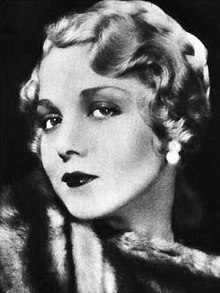Leila Hyams
This article has multiple issues. Please help improve it or discuss these issues on the talk page. (Learn how and when to remove these messages)
|
Leila Hyams | |
|---|---|
 Hyams as seen in Photoplay (1930) | |
| Born | May 1, 1905 New York City, New York, U.S. |
| Died | December 4, 1977 (aged 72) Bel Air, Los Angeles, U.S. |
| Years active | 1924 – 1936 |
| Spouse | Phil Berg (1927–1977) |
Leila Hyams (May 1, 1905, New York City, New York – December 4, 1977, Bel Air, California) was an American model, vaudeville and film actress. Her relatively short film career began in the 20's silent films, and ended in 1936 and although only lasted around 10 years, she appeared in more than 50 film roles.
Early life
Born in New York City to vaudeville comedy performers John Hyams, (1869-1940) and Leila (née McIntyre) Hyams (1882-1953). Both parents appeared in films and mother Leila Senior was also a noted stage performer, her parents can later be seen together in several Hollywood films such as in 1939's The Housekeeper's Daughter. Hyams appeared on-stage with her parents while still a child. As a teenager she worked as a model and became well known across the United States after appearing in a successful series of newspaper advertisements. This success led her to Hollywood.
Career

She made her first film in 1924, and with her blonde hair, green eyes, delicate features, and good natured demeanour, was cast in a string of supporting roles, where she was required to do very little but smile and look pretty. She proved herself capable of handling the small roles she was assigned, and over a period of time she came to be taken seriously as an actress. By 1928 she was playing starring roles, achieving success in MGM's first talkie release, Alias Jimmy Valentine (1928) opposite William Haines, Lionel Barrymore and Karl Dane. The following year she appeared in the popular murder mystery The Thirteenth Chair, a role that offered her the chance to display her dramatic abilities as a murder suspect. At Fox that same year she appeared in director Allan Dwan's now lost romantic adventure The Far Call opposite Charles Morton. The quality of her parts continued to improve as the decade turned, including a role as Robert Montgomery's sister in the prison drama The Big House (1930) with Chester Morris and Wallace Beery, for which Hyams once again received positive reviews. She then appeared in Surrender (1931).[1]
Although she succeeded in films that required her to play pretty ingenues, and developed into a capable dramatic actress in 1930s crime melodramas, she is perhaps best remembered for two early 1930s horror movies, as the wise-cracking but kind-hearted circus performer in Freaks (1932), and as the heroine in the Bela Lugosi film Island of Lost Souls (1932). Hyams was the original choice to play Jane in Tarzan the Ape Man (1932), but turned it down. The role was ultimately played by Maureen O'Sullivan.[1] She also appeared in the once controversial Jean Harlow film Red-Headed Woman (1932), the musical comedy The Big Broadcast (1932) with Bing Crosby, George Burns and Gracie Allen, and was praised for her comedic performance in Ruggles of Red Gap (1935), opposite Charlie Ruggles.[1]
Personal life
After ten years and fifty films, Hyams retired from acting in 1936, but remained part of the Hollywood community for the rest of her life. She was married to agent Phil Berg from 1927 until her death in the Bel-Air neighborhood of Los Angeles, California in 1977, aged 72.
References
- ^ a b c Leila Hyams at IMDb
